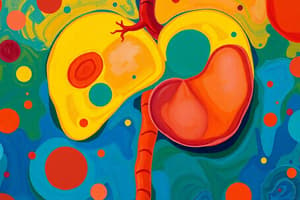Podcast
Questions and Answers
What primarily causes hypernatremia?
What primarily causes hypernatremia?
- Decrease in capillary filtration pressure
- Increased capillary permeability
- Loss of water from the ECF (correct)
- Excessive water retention
What hormone is involved in increasing excess sodium in the extracellular fluid?
What hormone is involved in increasing excess sodium in the extracellular fluid?
- Cortisol
- Aldosterone (correct)
- Adrenaline
- Anti-diuretic hormone
Which factor does NOT increase capillary filtration pressure?
Which factor does NOT increase capillary filtration pressure?
- Increased protein levels in plasma (correct)
- Resistance to outflow at post capillary sphincters
- Increased venous pressure
- Decreased resistance through precapillary sphincters
Which condition could lead to decreased capillary colloid osmotic pressure?
Which condition could lead to decreased capillary colloid osmotic pressure?
What happens to the capillary permeability when capillary pores are damaged?
What happens to the capillary permeability when capillary pores are damaged?
How much interstitial fluid volume increase is typically required to make edema evident?
How much interstitial fluid volume increase is typically required to make edema evident?
Which of the following is a common cause of edema related to capillaries?
Which of the following is a common cause of edema related to capillaries?
What role do plasma proteins play in edema formation?
What role do plasma proteins play in edema formation?
Which factor would decrease the capillary colloid osmotic pressure?
Which factor would decrease the capillary colloid osmotic pressure?
What effect does increased venous pressure have on capillary dynamics?
What effect does increased venous pressure have on capillary dynamics?
Flashcards are hidden until you start studying
Study Notes
Excess Water Retention
- Excess water retention dilutes the sodium in the extracellular fluid (ECF).
- This can be caused by excessive secretion of anti-diuretic hormone (ADH), which causes the kidneys to reabsorb more water.
Hypernatremia
- Hypernatremia is an increase in plasma sodium concentration.
- Causes include:
- Loss of water from the ECF, concentrating sodium ions. This can occur in cases of dehydration.
- Excess sodium chloride added to the ECF, for example, excessive secretion of the hormone aldosterone.
Edema
- Edema is visible swelling caused by fluid accumulation in interstitial spaces.
- Becomes apparent when interstitial fluid volume increases by 2.5 to 3 liters.
- The pathophysiological mechanisms of edema formation are:
- Increased capillary filtration pressure
- Decreased capillary colloidal osmotic pressure
- Increased capillary permeability
- Obstruction to lymph flow
Increased Capillary Filtration Pressure
- As capillary filtration pressure rises, the movement of vascular fluid into the interstitial spaces increases.
- Factors increasing capillary pressure include:
- Decreased resistance to flow through the precapillary sphincters
- Increased venous pressure or resistance to outflow at the post-capillary sphincters
Decreased Capillary Colloid Osmotic Pressure
- Plasma proteins exert capillary osmotic pressure, pulling fluid from the tissue back into the capillaries.
- Albumin, a plasma protein, plays a major role in this osmotic pressure.
- Edema caused by a decrease in capillary colloidal osmotic pressure results from inadequate production of albumin.
- Factors decreasing capillary pressure include:
- Severe illness
- Starvation and malnutrition (lack of amino acids needed for albumin production)
- Kidney diseases (inability to produce albumin or leakage of proteins into urine)
Increased Capillary Permeability
- Damaged capillary pores lead to increased permeability, allowing fluid to move into interstitial spaces.
- Factors increasing capillary permeability include:
- Burn injury
Studying That Suits You
Use AI to generate personalized quizzes and flashcards to suit your learning preferences.




